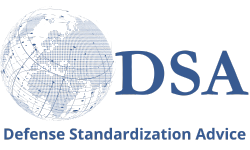Standards back in history
Since ancient history, standards have proven to be a valuable tool. In classical Greece, the first written standard (chiseled in stone) was made to ensure the quality of the pins used for holding columns together. The Greeks and Romans used standards for making bridges and aqueducts safe structures. In parallel defence standards had been established since ancient history covering the whole spectrum of military operations (standardized formations – tactics) and defence materiel (spheres, shields, body armor etc.).
In early days, standards were used in connection with trading. Pots for example, although handmade, were produced in fairly uniform sizes, hence ensuring comparable cubic measures. Coins were introduced in an attempt to have more standardized units of payment. Likewise, scales were standardized to avoid cheating in trade. Introduction of the metric system is thought to be among the first international standards, facilitating the comparison of distances across country borders and the preparation of more accurate maps.
Defence standards in modern age
The industrialization and increasing cross-border trade augmented the need for standards as a common platform for agreement. In 1865, the first international standardization organization, International Telegraph Union, ITU, was founded in Paris in connection with the extended use of telegraphy. In 1906, the International Electrotechnical Committee was founded, and in 1920 the forerunner of ISO, International Organization for Standardization, was set up. Since then tens of thousands of standards have been made that benefit society, business and consumers in various ways. Moreover the evolution of technology in conjunction with the emerging security challenges and threats, led the evolution of defence standards and their close relevance in most cases with civil standards.
The modern and globalized world cannot exist without standards supporting cooperation, trade, health, safety, economic growth, defence and security etc. Standards have a huge influence on everyday life and it is therefore crucial that they are developed in a context where anybody has the possibility of participating and where a standardization process governed by consensus allows all views to be heard and discussed in an open and transparent way. Openness and transparency are fundamental aspects of the work of standardization organizations.
The importance of standards makes it vital that we all have some knowledge of standards and standardization. Some need only a general insight into the nature of standards whereas others need in-depth knowledge of the dynamics of standardization and standards – the influence standards have on the market – how to implement standards in a business or how to get most out of standards. The importance of standards gives you a responsibility to define your involvement in standardization. Which knowledge is relevant to you? How can you use standards? And how can you contribute to the development of standards?
In light of this, we are guiding you in this section through the world standardization map starting with basic information on the civil standards domain before introducing the complex domain of defence standardization, which is actually our main area of concern and analysis.
Source note:
The information provided in this section is part of the Text Book for Higher Education ”World Built on Standards” issued by the Danish Standards Foundation.
